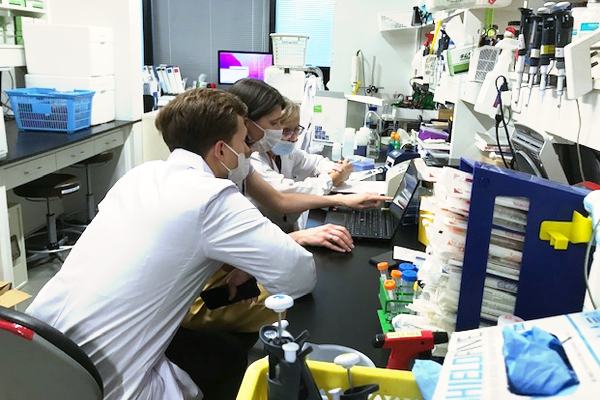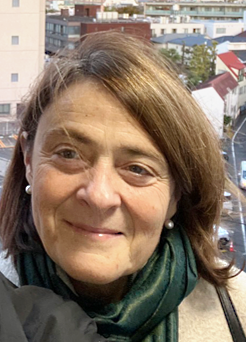PUBLICATIONS

For a full publication list please see the link below.
Lab publications of the last 3 years
- Salama Y, Munakata S, Osada T, Takahashi S, Hattori K, Heissig B. Heparin-binding EGF-like growth factor via miR-126 controls tumor formation/growth and the proteolytic niche in murine models of colorectal and colitis-associated cancers. Cell Death & Disease. 2024. Doi: 10.1038/s41419-024-07126-2.
- Skrypnyk M, Yatsenko T, Riabets O, Salama Y, Skikevych M, et al.. Heliyon. 2024 May 29;10(11):e31777. doi: 10.1016/j.heliyon.2024.e31777. eCollection 2024 Jun 15.
- Yatsenko T, Rios R, Nogueira T, Salama Y, Takahashi S, Adachi E, Tabe Y, Hattori N, Osada T, Naito T, Takahashi K, Hattori K, Heissig B. The influence of 4G/5G polymorphism in the plasminogen-activator-inhibitor-1 promoter on COVID-19 severity and endothelial dysfunction. Front. Immunol., Volume 15 - 2024 | https://doi.org/10.3389/fimmu.2024.1445294 30 August 2024
- Yatsenko T, Rios R, Nogueira T, Salama Y, Takahashi S, Tabe Y, Naito T, Takahashi K, Hattori K, Heissig B. Urokinase-type plasminogen activator and plasminogen activator inhibitor-1 complex as a serum biomarker for COVID-19. Front Immunol. 2024 Jan 11:14:1299792.; Front Immunol. 2024 Jan 11:14:1299792. doi: 10.3389/fimmu.2024.1390698.
- Mizoue Y, Ikeda T, Ikegami T, Riabets O, Oishi Y, Tobita M, Akutsu H, Hattori K, Heissig B, Koide K. The stem cell transcription factor ZEP296 transforms NIH3T3 cells and promotes anchorage-independent growth of cancer cells. Int J Dev Biol. 2023;67(4):147-153. doi: 10.1387/ijdb.230143hk.
- Salama Y, Takahashi S, Tsuda Y, Okada Y, Hattori K, and Heissig B. YO2 induces melanoma cell apoptosis through p53-mediated LRP1 downregulation. Cancers, 2023, 15, 288; doi 10.3390/cancers15010288.
- Heissig B, Salama Y, Iakoubov R, Vehreschild JJ, Rios R, et al. and on behalf of the LEOSS study group. COVID-19 Severity and Thrombo-Inflammatory Response Linked to Ethnicity. Biomedicines, 10(10), 2549; 2022.https://doi.org/10.3390/biomedicines10102549.
- Heissig B*, Salama Y*, Tateno M, Takahashi S, Hattori K. siRNA against CD40 delivered via a fungal recognition receptor ameliorates murine acute graft-versus-host disease. eJHaem, 2022, Volume 3, Issue 3; doi.org/10.1002/jha2.439
Beate HEISSIG (Associate Professor)
M.D., Ph.D.
E-mail :heissig@juntendo.ac.jp
プロフィール:
Beate Heissig received her MD and PhD from the Philipps University in Marburg, Germany. Her post-doctoral work was completed at Sloan Kettering Cancer Center and Cornell University, New York, under the mentorship of Professor Shahin Rafii and MAS Moore. After more than 10 years as a faculty member at The University of Tokyo, The Institute of Medical Science, she rejoined Juntendo University, Tokyo. She is an Associate Professor at the School of Medicine of Juntendo University and holds a concurrent appointment in the Department of General Education at the Faculty of Medicine. She is an associate editor of the journals International Cellular Signaling, Journal of Medical Sciences, and American Journal of Physiology-Cell Physiology, and she has served twice as associate editor for the Cancer Research journal.
She is recognized internationally for her fundamental discoveries about the role of proteases in stem cell biology and in regulating normal functioning and pathogenesis of tissues. Her research focuses on angiogenesis, inflammation, cancer, protease, and stem cell biology. Dr. Heissig has authored 70 articles with over 9518 citations.
Imagination is more important than knowledge.
Albert Einstein
Knowledge is limited. Imagination encircles the world.


